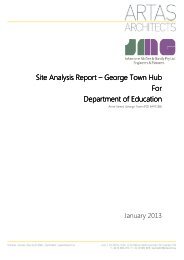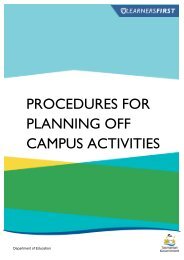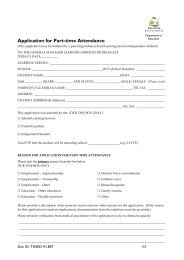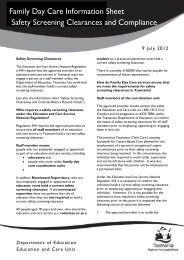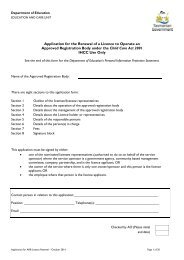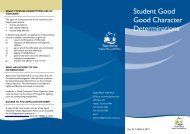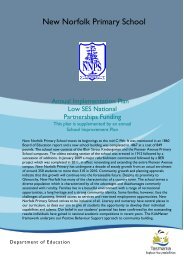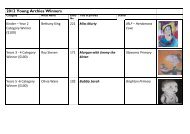Education
DoE Annual Report 2012-2013 - Department of Education
DoE Annual Report 2012-2013 - Department of Education
- No tags were found...
Create successful ePaper yourself
Turn your PDF publications into a flip-book with our unique Google optimized e-Paper software.
with Frameworks for Change, engaged through The Training Consortium. Workshops were tailored to meet the needs of<br />
the variety of different workplaces across the department. Specific workshops were designed and delivered for school<br />
principals and senior school leaders, school executive officers, Corporate Services Division managers, LINC managers,<br />
Polytechnic managers, speech and language pathology seniors, senior school psychologists and senior social workers.<br />
Between September 2012 and March 2013, a total of 52 workshops were delivered and total of 1,283 managers<br />
participated – as follows:<br />
Workshop audience<br />
Number of<br />
workshops<br />
Number of<br />
participants<br />
Principals/school leaders – south 10 276<br />
Principals/school leaders – north 6 245<br />
Principals/school leaders – north-west 6 145<br />
School executive officers 17 303<br />
Corporate Services managers 4 63<br />
LINC managers 3 60<br />
Polytechnic managers 4 66<br />
Mixed (mixed groups of managers from above groups, Early Years and Schools Division,<br />
Skills Tasmania, TQA and TRB).<br />
5 105<br />
Social work, speech and language pathology and school psychology seniors 2 20<br />
Principal network leaders have worked closely with<br />
principals across their networks to support the<br />
implementation of the Performance and Development<br />
Framework requirements and the alignment of the<br />
framework with school improvement planning and<br />
processes.<br />
Employees across schools and non-school workplaces have<br />
been provided with support and training to ensure their<br />
full and effective participation in the new performance<br />
management arrangements. Schools and workplaces have<br />
provided information and briefings to employees about<br />
the new arrangements. Data collected indicates over<br />
9,000 employees have been involved in these workplace<br />
familiarisation sessions.<br />
In addition, an online training module for employees was<br />
implemented in March 2013. The module is available to all<br />
employees and is designed for individual access, or to be<br />
used for a facilitated group discussion. The module provides<br />
a training path specific to each employment category,<br />
and takes employees through the PDP process with a focus<br />
on building confidence to prepare for and participate in the<br />
development of their PDP.<br />
Since implementation, the module has been accessed by<br />
2,198 individual employees, as well as being utilised by<br />
managers to introduce the new arrangements to their<br />
employees.<br />
The implementation target for the first year of the<br />
Performance and Development Framework was to ensure that<br />
all relevant employees had a PDP in place by 30 June 2013.<br />
This target has been achieved, with 98% of employees<br />
having a PDP in place at 30 June 2013. The majority of the<br />
remaining 2% are employees who are on long-term leave.<br />
Limited information regarding employee perceptions of<br />
the Performance and Development Framework has been<br />
obtained through the results of the Tasmanian State Service<br />
Workforce Survey. The survey was conducted during the<br />
implementation period and therefore not all employees<br />
had engaged in the PDP conversations with their manager<br />
at that stage. School-based employees did not participate<br />
in this survey and therefore only limited conclusions can be<br />
drawn from the results.<br />
The survey results were generally positive in respect of the<br />
Performance and Development Framework, even at this early<br />
stage. Results showed that 62% of respondents understand<br />
how the department’s performance management<br />
arrangements work. Approximately 70% of respondents<br />
agreed that the conversations they have with their<br />
manager provide constructive suggestions to improve their<br />
performance, and that they are able to raise any concerns<br />
they have about their performance with their manager.<br />
The results also showed a significant improvement on<br />
earlier survey results:<br />
• Approximately 20% more respondents agreed<br />
that performance reviews are focused on business<br />
outcomes compared to the 2011 survey. In addition,<br />
approximately 70% of respondents agreed that<br />
managers clearly communicate the goals and<br />
priorities of the organisation, compared to 58% in the<br />
2011 survey.<br />
• A positive aspect of the results was the high proportion<br />
of respondents who reported a good understanding of<br />
the skills and capabilities required of their role (86%),<br />
the ethical standards required of them (86%), and<br />
knowledge of the Code of Conduct (82%). In addition,<br />
62% of respondents agreed that the performance<br />
management system reinforces the State Service<br />
Principles, and the departmental values.<br />
• One of the negative aspects of the survey results<br />
was that only 36% of respondents considered that<br />
underperforming employees were managed well.<br />
This result should improve as awareness and utilisation<br />
of the managing underperformance procedures<br />
continues to grow.<br />
Overall, the survey results of employee perceptions provide<br />
an early indication that the Performance and Development<br />
Framework is providing employees with a positive<br />
opportunity to work with their manager to improve<br />
performance, and is establishing high levels of understanding<br />
of appropriate ethical and conduct standards.<br />
68 Required Reporting » Employee Performance and Development Programs



